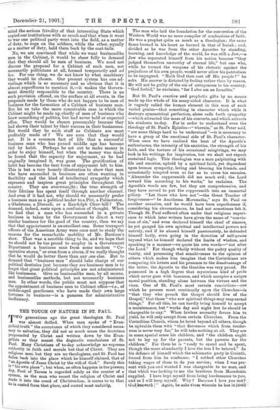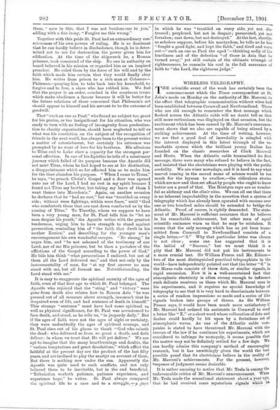THE TOUCH OF NATURE IN ST. PAUL.
T"generations ago the great theologian pt. Paul was alined' deified.: When men spoke of " Evan- gelical truth" the acceptance of which they considered neees- sau to salvation, they did not so much mean the doctrines Propounded by Christ and written down by . the Evan- gelists as they meant the dogmatic: conclusions of. St. Paul- gany. Christians'. of to-day. acknowledge no supreme authority_ in faith and morals but that of Christ:" They are religious men-, but they aie theologians, and St. Paul has fallen -back into the place which he himself claimed, that of " .A.postle of jeans Christ by the will of God." Surely this is his ,own place 7 ; but when, as often happens in the present day. Paul of . Tarsus is regarded, solely as the creator of a Systein. as 'the man who -recast the religion of Christ and made it into the creed of Christendom, it "seems to us that he is ousted fromthat place, and ousted most unfairly. • The man who laid the foundation for the conversion of the Western World was no mere compiler of confessions of faith. He was a prophet quite as much as a theologian ; the same flame burned in his heart as burned in that of Isaiah ; and, divided as he was from the other Apostles by standing, learning, and knowledge of the world, he was still a Jew,—a Jew who separated himself from his nation because 'they judged themselves unworthy of eternal life," but one who, while he turned the weapons of his rhetoric against the prejudices of his own people, would never allow his patriotism to be impugned. " Hath God then cast off His people ?" he asks. His answer is dictated by feeling rather than by reason. He will not be guilty of the sin of antagonism to his country.- "God, forbid," he exclaims, "for I also am an Israelite," But St. Paul's creative and prophetic gifts by no means made up the whole of his many-sided character. It is what is vaguely called the human element in this man of such varied genius—that something in character which while it destroys symmetrical perfection, alone calls forth sympathy —which attracted the mass of his converts, and which attracts his students to-day. For in order to understand even the theology of St. Paul's Epistles—" wherein," as St. Peter said "are some things hard to be understood "—it is necessary to have a grasp of the emotional side of St. Paul's character. When once we have realised the heat of the Apostle's enthusiasms, the intensity of his anxieties, the strength of his faith, and the torture of his occasional misgivings, we may look in his writings for inspiration, but we shall not expect sustained logic. This theologian was a man palpitating with life and emotion, upheld by a spiritual faith, yet dependent upon human sympathy, loving and blessing his friends, and occasionally tempted even so far as to curse his enemies. "Alexander the coppersmith did me much evil; the Lord reward him according to his works," he exclaims. The Apostle's words are few, but they are comprehensive, and they have served to put the coppersmith into an immortal pillory. "Let those who love not "—the Great Teacher of forgiveness—" be Anathema Ifaranatha," says St. Paul on another occasion, and he would have been superhuman if, considering his circumstances, he had not sometimes felt it. Though St. Paul suffered often under that religious experi- ence to which later writers have given the name of "convic- tion of sin," and even declared himself the chief of sinners, he yet gauged his own spiritual and intellectual powers not untruly, and if he abased himself passionately, he defended himself hotly, even going in the direction of self-praise beyond what he himself declared the limits of wisdom, and speaking in a manner—we quote his own words—" not after the Lord." For though wholly without the paltry quality of vanity, and possessing that sensitiveness to the opinion of others which makes him imagine that the Corinthians are comparing his letters and his presence to the disadvantage of the latter, the Apostle to the Gentiles was very proud. He possessed in a high degree that mysterious kind of pride which never goes with baseness, and which occupies a unique moral position, standing alone between the virtues and the vices. One of -St. Paul's most certain convictions—one which he presses most continually upon the Churchesis "that they who preach the Gospel should live of the Gospel," that those "who sow spiritual things may reap carnal things." For all this, he can hardly bring himself to accept a maintenance, but " works day and night lest he should be chargeable to any." When lawless necessity forces him to yield, he will only accept from certain Churches. From the Corinthian Church, whom he loved beyond all others, though. he upbraids them with "that fierceness which from tender. ness is never very far," he will take nothing at all. They are in some special sense his children, and "the children ought. not to lay up for the parents, but the parents for the' children." For them he is " ready to spend and be spent, though' the more abundantly I love the less I be beloved." In his defenCe of himself which the schismatic party in Corinth, forced from him he confesses: "X robbed other Churches taking wages of them to do you service; when I was pre- sent with you and wanted I was chargeable to no man, and that which was lacking to me the brethren from Macedonia supplied. I have kept myself from being burdensome to you, and so I will keep myself, Why ? Because I love you not?. Goilantweth ! " Again, he asks them wherein he haa in
them,' save in this, that I was not burclensame to you," adding with a fine irony, "Forgive me this wrong."
Together with this pride St. Paul had an extraordinary con: sciousneas of his own powers of ruling. He is so dominant that he can hardly believe in disobedience, though he is deter- mined not to use for destruction the power given him for edification. At the time of the shipwreck he, a Roman prisoner, took command of the ship. No one in authority on board believed in his mission or regarded him as an inspired preacher. He ruled them by the force of his will and by the faith which made him certain that they would finally obey him. He writes from prison to a rich man at Colossus- Philemon—praying him to take back into his household, to forgive and to free, a slave who has robbed him. We feel that the prayer is an order, couched in the courteous terms which make obedience a favour because it will be better for the future relations of those concerned that Philemon's act should appear to himself and his servant to be the outcome of goodwill.
That" such an one as Paul," who found no subject too great for his genius, or too insignificant for his attention, who was ready to turn with no feeling of incongruity from predestina- tion to charity organisation, should have neglected to tell us what was his conviction on the subject of the recognition of friends in the next world, has always been to the present writer a matter of astonishment, but certainly his reticence was prompted by no want of love for his brethren. His allusions to Titus and to Luke show a capacity for the strongest per- sonal affection. In one of his Epistles he tells of a missionary journey which failed of its purpose because the Apostle did not meet Titus, whom he had hoped to see at his destination, a disappointment which so far affected him as to make him for the time abandon his purpose. "When I came to Troas," he says, "to preach Christ's Gospel and a door was . opened unto me of the Lord, I had no rest in my spirit because I found not Titus my brother, but taking my leave of them I went thence into Macedonia." Again, on another occasion he declares that he "had no rest," but was "troubled on every side ; without were fightings, within were fears," until "God who comforteth those that are cast down comforted us by the coming of Titus." To Timothy, whom we suppose to have been a very young man, for St. Paul tells him to "let no man despise his youth," the Apostle writes with the greatest tenderness, urging him to have strength to stand against persecution, reminding him of "the faith that dwelt in his mother Eunice," and describing for the younger man's encouragement his own wonderful escapes. "Be strong," he urges him, and "be not ashamed of the testimony of our Lord, nor of me His prisoner, but be thou a partaker of the afflictions of the Gospel according to the power of God." He bids him think "what persecutions I endured, but out of them all the Lord delivered me," and that not only by the instrumentality of man, for "at my first answer no man stood with me, but all forsook me. Notwithstanding, the Lord stood with me."
It is easy to exaggerate the spiritual serenity of the ages of faith, even of that first age to which St. Paul belonged. The Apostle who rejoiced that the " sting " and " victory " were gone from death also relates how in Roman Asia "he was pressed out of all measure above strength, insomuch that he despaired even of life, and had sentence of death, in himself." This strange " sentence " must have had some spiritual as well as physical significance, for St. Paul was accustomed to face death, and stood, as he tells us, " in jeopardy daily." But if the ages of faith were not the ages of sight or certainty, they were undoubtedly the ages of spiritual courage, and St. Paul rises out of his gloom to thank "God who raiseth the dead : who delivered us from so great a death, and doth deliver: in whom we trust that He will yet deliver." We are apt to imagine that the many heartburnings and doubts, the "various temptations and great desolations," which afflict the faithful at the present day are the product of the last fifty years, and are inclined to play the martyr on account of them. But there is nothing new under the sun. Apparently the Apostle was quite used to such conflicts, and not only believed them to be inevitable, but in the end beneficial. "Tribulation worketh patience, patience experience, and experience hope," he writes. St. Paul always compared the spiritual life to a race and to a struggle, —?, Jape in which he was "troubled, on every side, yet not die. tressed ; perplexed, but not in despair; persecuted, yet not forsaken; cast down, but not destroyed." At the last, shortly, as scholars suppose, before his martyrdom, he tells us he has "fought a good fight, and kept the faith," and tired and worn out." such an one as Paul the aged!'—thinking sadly of his loneliness and of the defection "of those in Asia that be turned away," yet still certain of the ultimate triumph of righteousness, he commits his soul in the full assurance of faith to "the Lord, the righteous judge."











































 Previous page
Previous page